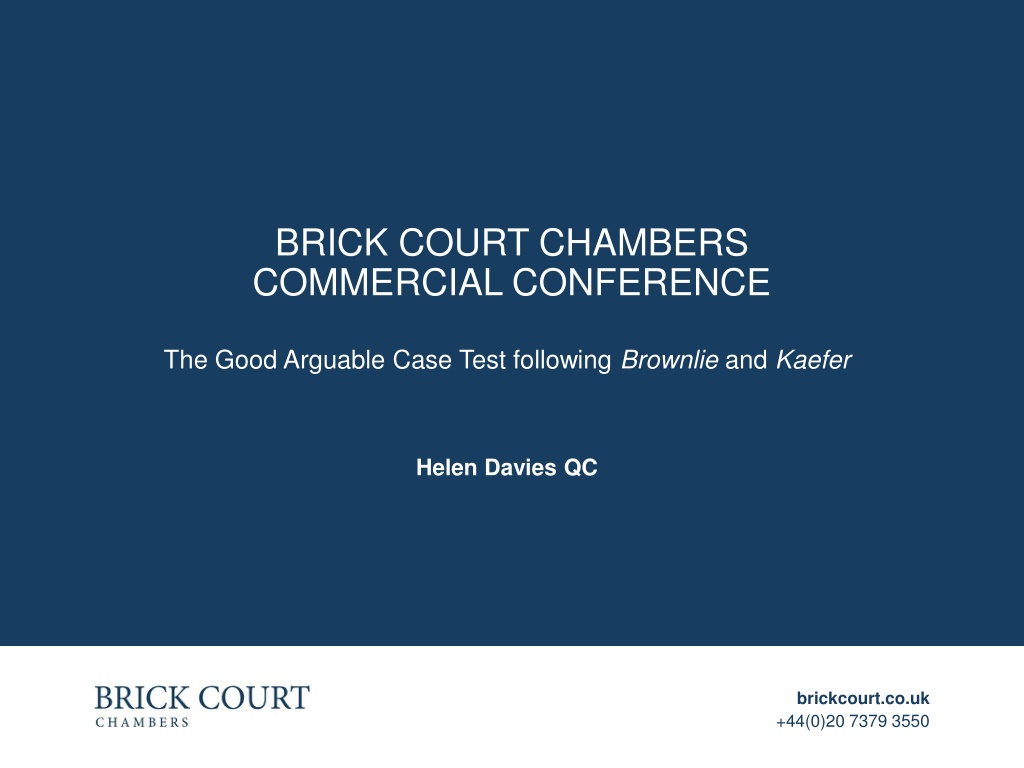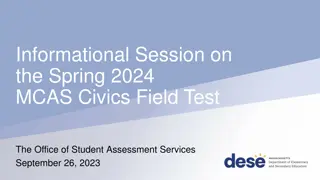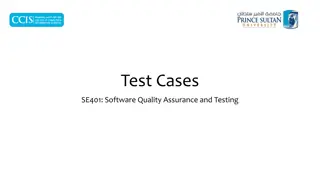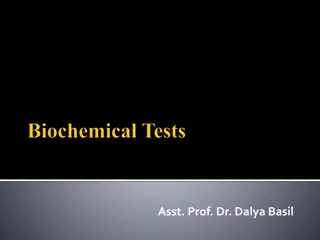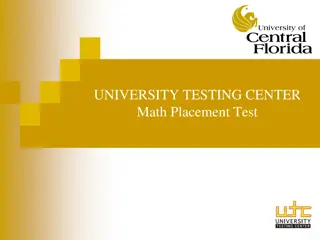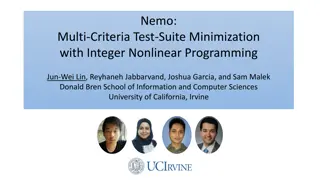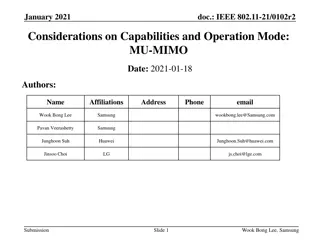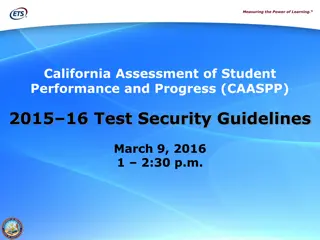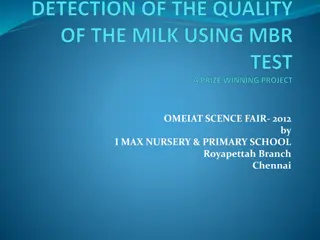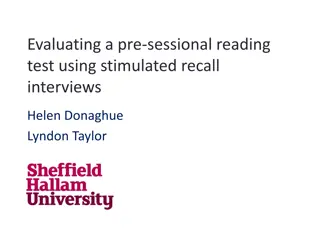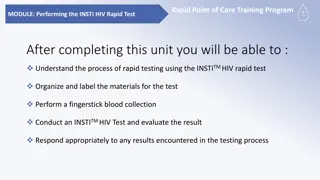The Good Arguable Case Test Following Brownlie and Kaefer
The Good Arguable Case Test as explored in cases like Brownlie v. Four Seasons Holdings Inc. and Kaefer Aislamientos S.A. de C.V. v. AMS Drilling Mexico S.A. de C.V. provides a nuanced understanding of the criteria for a plausible evidential basis in legal matters. Baroness Hale and Lord Sumption's interpretations contribute to a clearer application of this test within the legal framework.
Download Presentation

Please find below an Image/Link to download the presentation.
The content on the website is provided AS IS for your information and personal use only. It may not be sold, licensed, or shared on other websites without obtaining consent from the author.If you encounter any issues during the download, it is possible that the publisher has removed the file from their server.
You are allowed to download the files provided on this website for personal or commercial use, subject to the condition that they are used lawfully. All files are the property of their respective owners.
The content on the website is provided AS IS for your information and personal use only. It may not be sold, licensed, or shared on other websites without obtaining consent from the author.
E N D
Presentation Transcript
BRICK COURT CHAMBERS COMMERCIAL CONFERENCE The Good Arguable Case Test following Brownlie and Kaefer Helen Davies QC brickcourt.co.uk +44(0)20 7379 3550
THE GOOD ARGUABLE CASE TEST FOLLOWING BROWNLIE AND KAEFER Canada Trust Co v Stolzenberg (No 2) 1998 1 WLR 547 Good arguable case = much the better of the argument Brownlie v Four Seasons Holdings Inc [2017] UKSC 80, per Lord Sumption (obiter) Good arguable case much the better of the argument, which wrongly suggests a superior standard of conviction that is both uncertain and unwarranted Good arguable case = serviceable test, provided that it is correctly understood brickcourt.co.uk +44(0)20 7379 3550
THE GOOD ARGUABLE CASE TEST FOLLOWING BROWNLIE AND KAEFER Brownlie v Four Seasons Holdings Inc [2017] UKSC 80, per Lord Sumption at [7] (obiter) What is meant by the good arguable case test is Limb 1 - that the claimant must supply a plausible evidential basis for the application of a relevant jurisdictional gateway Limb 2 - that if there is an issue of fact about it, or some other reason for doubting whether it applies, the court must take a view on the material available if it can reliably do so; but Limb 3 - the nature of the issue and the limitations of the material available at the interlocutory stage may be that no reliable assessment can be made, in which case there is a good arguable case for the application of the gateway if there is a plausible (albeit contested) evidential basis for it. brickcourt.co.uk +44(0)20 7379 3550
THE GOOD ARGUABLE CASE TEST FOLLOWING BROWNLIE AND KAEFER Brownlie v Four Seasons Holdings Inc [2017] UKSC 80, Baroness Hale at [33] Test = good arguable case , glosses should be avoided Lord Sumption s explication does not gloss the test Goldman Sachs International v Novo Banco SA [2018] UKSC 34, Lord Sumption in Brownlie this Court reformulated the good arguable case test such = 3 limbs brickcourt.co.uk +44(0)20 7379 3550
THE GOOD ARGUABLE CASE TEST FOLLOWING BROWNLIE AND KAEFER Kaefer Aislamientos SA de CV v AMS Drilling Mexico SA de CV [2019] EWCA Civ 10 Green LJ a test intended to be straightforward has become befuddled by glosses, glosses upon glosses, explications and reformulations Nigel Davis LJ in something of a fog as to the difference between an explication and a gloss brickcourt.co.uk +44(0)20 7379 3550
THE GOOD ARGUABLE CASE TEST FOLLOWING BROWNLIE AND KAEFER Kaefer Aislamientos SA de CV v AMS Drilling Mexico SA de CV [2019] EWCA Civ 10, per Green LJ sought to make sense of the new reformulated test A plausible evidential basis in Limb 1 = evidential basis showing that the claimant has the better of the argument Limb 2 = instruction to the court to overcome evidential difficulties and arrive at a conclusion if it reliably can, applying judicial common sense and pragmatism, not least because the exercise is intended to be one conducted with due dispatch and without oral evidence Limb 3 arises where court finds itself simply unable to form a decided conclusion and not able to say who has the better argument. Solution = introducing a flexible test combining good arguable case and plausibility of evidence not necessarily conditional upon relative merits brickcourt.co.uk +44(0)20 7379 3550
. AND COD WARS Alexander Tugushev v Vitaly Orlov [2019] EWHC 645 (Comm), Carr J at [60] Important not to overcomplicate what should be a straightforward test to be applied sensibly to the particular facts and issues arising in each individual case Whatever perorations there may be along the way, the ultimate test remains one of good arguable case = having the better of the argument , which confers a desirable degree of flexibility in the evaluation of the court Test to be understood by reference to the new, reformulated three limb test identified in Brownlie brickcourt.co.uk +44(0)20 7379 3550
. AND COD WARS Alexander Tugushev v Vitaly Orlov [2019] EWHC 645 (Comm), Carr J at [60] One of key issues was whether T had a good arguable case that O resident in the jurisdiction, when O had served extensive sworn evidence from multiple deponents that he lived in Murmansk and his property in London was an investment property/private hotel Not necessary for T to put forward positive evidence in order to succeed T had to show good arguable case which could at least partly be done through inference brickcourt.co.uk +44(0)20 7379 3550
. AND COD WARS Battered! Billionaire oligarch dubbed 'fish king' who supplies one cod in five eaten in UK - LOSES 4m bid to have legal fight with business rival heard in Russia brickcourt.co.uk +44(0)20 7379 3550
BRICK COURT CHAMBERS COMMERCIAL CONFERENCE Dealing with establishing/challenging jurisdiction Sarah Abram brickcourt.co.uk +44(0)20 7379 3550
REFLEXIVE APPLICATION Under the Brussels and Lugano regimes Daniel Jowell Q.C. brickcourt.co.uk +44(0)20 7379 3550
REFLEXIVE APPLICATION Exclusive jurisdiction clause in favour of a non-contracting ( third ) state Lis alibi pendens: the same or similar proceedings pending in a third state Special subject matter relating to a third state: immoveable property; validity of constitution/decisions of a company; validity of patents and IP rights; validity of entries on a public register; enforcement of judgments. brickcourt.co.uk +44(0)20 7379 3550
LUGANO CONVENTION Privatbank v Kolomoisky [2019] EWCA Civ 1708, 151 189. brickcourt.co.uk +44(0)20 7379 3550
BRUSSELS REGULATION RECAST Articles 33 and 34 Brussels Regulation Recast Gulf International v Aldwood [2019] EWHC 1666 (QB) brickcourt.co.uk +44(0)20 7379 3550
BRICK COURT CHAMBERS COMMERCIAL CONFERENCE Jurisdiction after Brexit Charlotte Thomas brickcourt.co.uk +44(0)20 7379 3550
BRICK COURT CHAMBERS COMMERCIAL CONFERENCE brickcourt.co.uk +44(0)20 7379 3550
ANTI-SUIT INJUNCTIONS IN SUPPORT OF LONDON ARBITRATION Clauses providing for Court Jurisdiction and Arbitration JASBIR DHILLON QC brickcourt.co.uk +44(0)20 7379 3550
PERKINS ENGINES V. GHADDAR [2018] 2 LLOYDS REP. 197: THE FACTS Perkins was subsidiary of Caterpillar, one of world s leading suppliers of gas and diesel engines. Ghaddar was distributor of Perkin s engines in Lebanon. Relationship governed by written Distributor Agreement concluded in 1990. In 2017 Ghaddar admitted to selling engines supplied under Distributor Agreement into Syria, which was arguably contrary to US sanctions. In March 2018 Perkins terminated the Distributor Agreement on ground that sales by Ghaddar into Syria amounted to breach of the Distributor Agreement. In April 2018 Ghaddar commenced Lebanese proceedings against Perkins seeking damages for unlawful termination of the agreement under Lebanese law. In May 2018 Perkins issued a Notice of Arbitration to Ghaddar and thereafter issued an Arbitration Claim in the Commercial Court seeking an interim anti-suit injunction restraining the Lebanese proceedings. brickcourt.co.uk +44(0)20 7379 3550
PERKINS ENGINES V. GHADDAR [2018] 2 LLOYDS REP. 197: THE DISPUTE RESOLUTION CLAUSE Clause 23.6 of the Distributor Agreement provided: This Agreement shall be deemed to be an agreement made in England and shall be read and construed and take effect in all respects in accordance with the Laws of England and the Parties hereby submit to the jurisdiction of the English Courts. To the extent there is no reciprocal enforcement procedures between the United Kingdom and the country in which the Distributor is located the Parties agree to submit any dispute arising between them that cannot amicably be settled to arbitration. The arbitration shall be held in London, England ... (Emphasis added) brickcourt.co.uk +44(0)20 7379 3550
PERKINS ENGINES V. GHADDAR [2018] 2 LLOYDS REP. 197: THE ISSUES Meaning of Arbitration Clause no reciprocal enforcement procedures between the UK and [Lebanon] : Perkins I: There must be a bilateral or multilateral treaty providing for enforcement of court judgments between UK and Lebanon which prescribes the mutual enforcement procedures which both countries will use to enforce each other s judgments. Perkins II: The actual dispute which has arisen between the parties must be subject to reciprocal enforcement procedures between UK and Lebanon. Ghaddar: There must be domestic laws of UK and Lebanon which are substantially or functionally equivalent and permit enforcement of court judgments in UK and Lebanon. brickcourt.co.uk +44(0)20 7379 3550
PERKINS ENGINES V. GHADDAR [2018] 2 LLOYDS REP. 197: LEGAL PRINCIPLES Court has jurisdiction to grant interim anti-suit injunction to restrain a breach of an English arbitration agreement under s. 37 of Senior Courts Act 1981: Ust- Kamenogorsk Hydropower Plant JSC v. AES Ust-Kamenogorsk Hydropower Plant LLP [2013] 1 W.L.R. 1889, at [48] (Lord Mance). English law arbitration agreement will be construed in accordance with: (1) General principles of contractual interpretation by reference to authoritative summaries by the Supreme Court in Arnold v. Britton [2015] A.C. 1619 and Wood v. Capita Insurance [2017] A.C. 1173; and (2) Principles of contractual interpretation applicable to a dispute resolution clause in a commercial contract stated by the House of Lords in Fiona Trust v. Privalov [2008] 1 Lloyd s Rep. 254. brickcourt.co.uk +44(0)20 7379 3550
PERKINS ENGINES V. GHADDAR [2018] 2 LLOYDS REP. 197: BRYAN J. S JUDGMENT Perkins s primary meaning is correct: Unless there is a bilateral or multilateral treaty providing for enforcement of court judgments between UK and Lebanon, the parties must arbitrate any dispute because: (1) Ordinary and natural meaning of words used; (2) Clause refers to UK not England; (3) Meaning supported by business common sense and reasonableness. brickcourt.co.uk +44(0)20 7379 3550
PERKINS ENGINES V. GHADDAR [2018] 2 LLOYDS REP. 197: BRYAN J. S JUDGMENT Perkin s Alternative Meaning Correct: Clause requires that actual dispute which has arisen between the parties is subject to the reciprocal enforcement procedures between the UK and Lebanon. There are no reciprocal enforcement procedures between the UK and Lebanon for the actual dispute. If the English jurisdiction clause applied, does it preclude pursuit of the Lebanese Proceedings if the jurisdiction of the English Court has been invoked notwithstanding that it does not state it is exclusive : BNP Paribas v Anchorage Capital [2013] EWHC 3073 (Comm) and Global Maritime Investments v OW Supply & Trading [2015] EWHC 2690 (Comm); cf Deutsche Bank v. Highland Crusader [2010] 1 W.L.R. 1023. brickcourt.co.uk +44(0)20 7379 3550
ASPECTS OF ANTI-SUIT INJUNCTIONS Richard Lord QC brickcourt.co.uk +44(0)20 7379 3550
STRONG REASON/ DISCRETION ? Anti-Suit Injunctions (ASIs) tend to focus on two sets of issues, at least in the case of contractual or quasi contractual ones The first is the existence of an exclusive English Jurisdiction Clause ( EJC ) or London arbitration clause The second (on which this talk focuses) is what has happened or may happen in the actual/threatened foreign proceedings to which (or technically to the parties to which) ASIs are by their nature directed brickcourt.co.uk +44(0)20 7379 3550
CONTEXT What occurs overseas is often said to be relevant under three principal and related headings being Delay Submission to jurisdiction Comity Whilst these can all be regarded as essentially discretionary features, much law has developed round them. brickcourt.co.uk +44(0)20 7379 3550
THE DILEMMA What should a party do in relation to the foreign proceedings do? Nothing ? This risks an adverse finding in proceedings which may be valid by local procedural and substantive law. Engage ? This risks problems, when an ASI is sought, with possible allegations of Delay Submission to jurisdiction Comity brickcourt.co.uk +44(0)20 7379 3550
ANGELIC GRACE[1995] 1 LLOYDS REP. 87 [p.96] In my judgment, where an injunction is sought to restrain a party from proceeding in a foreign Court in breach of an arbitration agreement governed by English law, the English Court need feel no diffidence in granting the injunction, provided that it is sought promptly and before the foreign proceedings are too far advanced The jurisdiction is, of course, discretionary and is not exercised as a matter of course, but good reason needs to be shown why it should not be exercised in any given case. Note that in that case the injunction was granted after rejected of a submission that an applicant ought to challenge the foreign court s jurisdiction before seeking an ASI. Now not only is an applicant not bound to do so, but doing so may be fraught with peril from the English ASI perspective. brickcourt.co.uk +44(0)20 7379 3550
DELAY I failed in The Kishore[2016] 1 Lloyd s Rep. 427 to persuade Paul Walker J. that the concept of delay and degree of advancement of foreign proceedings were related. Thus although other factors played a part, the delay whilst my clients challenged jurisdiction in China was fatal. Since then the emphasis on delay as a factor in its own right has grown (see Ecobank [2016] 1 WLR 2231, ADM Asia-Pacific Trading PTE Ltd v PT Budi Semesta Satria [2016] EWHC 1427, The Magellan Spirit [2016] 2 Lloyd's Rep. 1 ) although it remains a discretionary factor brickcourt.co.uk +44(0)20 7379 3550
SUBMISSION TO THE JURISDICTION This contains traps for the unwary. The test is usually couched as to whether there was truly voluntary submission: see eg Raphael 2nd Edn 8.22. The question is to be judged by reference to English law: Pan Ocean [39-40], Ecobank v Tanoh [2015] EWCA 1309 [57-59]. However, an international context requires a broader approach: Rubin v Eurofinance [2013] 1 A.C. 236 [159-161]. There is an important distinction between invoking jurisdiction to determine jurisdiction and invoking jurisdiction to determine the merits: Williams & Glyn s Bank plc v Astro Dinamico Cia Naviera SA [1984] 1 WLR 438, 443. brickcourt.co.uk +44(0)20 7379 3550
SUBMISSION THE TEST The question of submission is one of fact, the question being a step in the proceedings only amounts to a submission when the defendant has taken some step which is only necessary or only useful if the objection [to the jurisdiction] has been actually waived Williams & Glyn s Bank plc v Astro Dinamico Cia Naviera SA [1984] 1 WLR 438 at 444. brickcourt.co.uk +44(0)20 7379 3550
SUBMISSION However An application for a stay in the foreign court may itself be a submission although may not be or may not be of any significant weight: see the discussion in Pan Ocean v China- Base [2019] EWHC 982 (Comm) [39-57] If a jurisdiction challenge fails and then a party has the choice of walking away and facing a default judgment or contesting the merits, the latter course still counts as voluntary submission: Atlantic Emperor[1992] 1 Lloyd s Rep. 624, Ecobank [57-67] Again a question of discretion: Pan Ocean [47] brickcourt.co.uk +44(0)20 7379 3550
COMITY Ecobank[132] Comity has a warm ring. We are not concerned with judicial amour proper but with the operations of systems of law. The problem is most acute when the foreign court has jurisdiction by its own procedural and/or conflict of law rules. Nonetheless the English law takes the view, which is logical if open to the criticism of being slightly Anglocentric, that if by English procedural and conflict law rules there is an EJC or London arbitration clause that will be protected by an ASI: OT Africa Line[2005] 2 Lloyd s Rep. 170, Akai[1998] 1 Lloyd s Rep. 90, Yusuf Cepnioglu[2016] 1 Lloyd s Rep. 641 The foreign court might take the same view and issue its own ASI. brickcourt.co.uk +44(0)20 7379 3550
FINALLY - IS SOMETHING GUANG RONG HERE ? The facts of The Guang Rong [2019] EWHC 2284 are complex. It involved allegations of a fraudulent scheme to avoid Chinese import duty on oil cargoes and an interlocking web of contracts of the usual type in international trade: charterparties, sub-charterparties, bills of lading, sale contracts, letters of credit In legal terms it involved a familiar question of whether an EJC between A and B prohibits B taking action elsewhere against C as well as B. This is a question of construction, and received an orthodox answer [27-32]. brickcourt.co.uk +44(0)20 7379 3550
THE NOVEL BIT Here however C, who was not party to the EJC was also held entitled to an injunction to prevent proceeding by B against C in tort, on the grounds that this was a circumvention of the EJC by a procedural manoeuvre and manipulation and thus vexatious/oppressive [33-35]. It is suggested that the Courts ought to be very careful about extension of the vexatious/oppressive approach in this way, except in the most extreme cases, which this did not appear to be. It may devalue the ASI currency if foreign courts are deprived of jurisdiction to adjudicate themselves on the validity of such claims which are not brought in breach of an EJC. brickcourt.co.uk +44(0)20 7379 3550
STATE IMMUNITY IN COMMERCIAL ARBITRATION Recent Developments Jonathan Dawid brickcourt.co.uk +44(0)20 7379 3550
EFFECTS OF STATE IMMUNITY Where a state party is involved, state immunity can be relevant at numerous stages of the arbitral process: Jurisdiction Registration of Award Enforcement Peremptory Orders brickcourt.co.uk +44(0)20 7379 3550
HISTORICAL OVERVIEW Traditional approach: absolute immunity at common law 1972: European Convention on State Immunity 1978: State Immunity Act 2004: UN Convention on Jurisdictional Immunities of States & their Property Signed by UK in 2005 but not yet ratified. Customary International law: Germany v Italy, ICJ Rep 2012 brickcourt.co.uk +44(0)20 7379 3550
EUROPEAN CONVENTION ON STATE IMMUNITY Article 12: 1. Where a Contracting State has agreed in writing to submit to arbitration a dispute which has arisen or may arise out of a civil or commercial matter, that State may not claim immunity from the jurisdiction of a court of another Contracting State on the territory or according to the law of which the arbitration has taken or will take place in respect of any proceedings relating to: (a) the validity or interpretation of the arbitration agreement; (b) the arbitration procedure; (c) the setting aside of the award, unless the arbitration agreement otherwises provides. 2. Paragraph 1 shall not apply to an arbitration agreement between States. Implemented in UK by the brickcourt.co.uk +44(0)20 7379 3550
STATE IMMUNITY ACT 1978 (1) Section 9: (1) Where a State has agreed in writing to submit a dispute which has arisen, or may arise, to arbitration, the State is not immune as respects proceedings in the courts of the United Kingdom which relate to the arbitration. (2) This section has effect subject to any contrary provision in the arbitration agreement and does not apply to any arbitration agreement between States. Section 13(2)(b): the property of a State shall not be subject to any process for the enforcement of a judgment or arbitration award brickcourt.co.uk +44(0)20 7379 3550
STATE IMMUNITY ACT 1978 (2) Exceptions to bar on enforcement: 13(3): Subsection (2) above does not prevent the giving of any relief or the issue of any process with the written consent of the State concerned; and any such consent (which may be contained in a prior agreement) may be expressed so as to apply to a limited extent or generally; but a provision merely submitting to the jurisdiction of the courts is not to be regarded as a consent for the purposes of this subsection 13(4): Subsection (2)(b) above does not prevent the issue of any process in respect of property which is for the time being in use or intended for use for commercial purposes; but, in a case not falling within section 10 above, this subsection applies to property of a State party to the European Convention on State Immunity only if (b) the process is for enforcing an arbitration award. brickcourt.co.uk +44(0)20 7379 3550
JURISDICTION TO ENFORCE: TATNEFT V UKRAINE PAO Tatneft v Ukraine [2018] EWHC 1797 (Comm) UNCITRAL arbitration by Russian company against Ukraine under BIT Tribunal held Ukraine breached Fair and Equitable Treatment standard Awarded US$ Tatneft obtained ex parte enforcement order under s101(2) Arbitration Act 1996 Ukraine applied to set aside under Section 9 SIA. Common ground that Ukraine entitled to immunity unless s9 SIA applied Enforcement proceedings relate to the arbitration for purpose of s9: Svenska Petroleum v Lithuania (No 2) [2007] QB 886 But Ukraine said never agreed to arbitrate the dispute brickcourt.co.uk +44(0)20 7379 3550
TATNEFT V UKRAINE (CONTINUED) Ukraine s argument: FET standard not found in BIT hence award not within jurisdiction of Tribunal Tatneft: Ukraine waived jurisdiction point by not taking it before Tribunal i.e. same approach as challenges to award under s67 & 73 Arbitration Act Challenge to FET standard is challenge to merits, not jurisdiction Butcher J at [35-37] Ukraine not precluded from challenging jurisdiction on points which were not taken before Tribunal No analogy with s 67 Arbitration Act because under S1 SIA, a state is immune unless there is an exception provided for in the Act Court has to give effect to immunity, even at enforcement stage, unless satisfied that State agreed to submit dispute to arbitration Waiver would require conduct which clearly indicated that the state was foregoing reliance on a particular point not just for the purposes of the arbitration but for wider purposes including any subsequent issues as to state immunity But went on to find that Tribunal s finding on FET standard went only to merits and not jurisdiction brickcourt.co.uk +44(0)20 7379 3550
SERVICE OF ENFORCEMENT ORDER: GENERAL DYNAMICS Applications for orders to enforce awards are governed by CPR 62.18 62.18(1): Application to be made without notice in arbitration claim form 62.18(2): Court may specify parties on whom claim form to be served 62.18(7): Order giving permission to enforce must be served. 62.18(8): If defendant out of jurisdiction, may be served without permission as if the order were an arbitration claim form . Section 12 SIA(1): Any writ or other document required to be served for instituting proceedings against a State shall be served by being transmitted through the Foreign and Commonwealth Office Question: Does an order for enforcement need to be served on a foreign state through the FCO? No: General Dynamics UK Ltd v Libya [2019] EWCA Civ 110 brickcourt.co.uk +44(0)20 7379 3550
GENERAL DYNAMICS V LIBYA (CONTINUED) ICC Award against Libya for 21 million Teare J granted ex parte order to enforce, but dispensed with service & only required order to be brought to attention of Libyan government Males J set aside order: service via FCO under s 12 SIA was mandatory Court of Appeal (Sir Terence Etherton, Longmore & Flaux LJJ) S12 SIA not applicable to order giving permission to enforce because it is not the document instituting proceedings Court has power to dispense with service of Order against a state But should only exercise that power in exceptional circumstances Held test satisfied in circumstances of case & allowed appeal. brickcourt.co.uk +44(0)20 7379 3550
FURTHER READING Reliance industries v India [2018] EWHC 822 (Comm) Pearl Petroleum v Kurdistan [2015] EWHC 3361 (Comm) brickcourt.co.uk +44(0)20 7379 3550
ALTERNATIVE SERVICE UNDER THE HAGUE CONVENTION Zahra Al-Rikabi brickcourt.co.uk +44(0)20 7379 3550
RELEVANT CPR PROVISIONS Service of the claim form by an alternative method or at an alternative place: CRP r 6.15 Power of the Court to dispense with service of the claim form: CPR r 6.16 Application for permission to serve the claim form out of the jurisdiction: CPR r 6.37(5) Methods of service general provisions: CPR r 6.40(1); where service is to be effected out of the United Kingdom CPR r 6.40(3) and (4) Service of a claim form: CPR 7.5(2) Extension of time for serving a claim form: CPR 7.6 brickcourt.co.uk +44(0)20 7379 3550
SOURCE OF THE POWER The source of the power to make an order for service by an alternative method in respect of a person who was out of the jurisdiction is CPR r 6.37(5)(b)(i) 6.37 Application for permission to serve the claim form out of the jurisdiction (5) Where the court gives permission to serve a claim form out of the jurisdiction (b) it may (i) give directions about the method of service; and It follows that an order for permission to serve out of the jurisdiction is always required, regardless of whether alternative service takes place within or outside the jurisdiction: Marashen Ltd v Kenvett Ltd [2017] EWHC 1706 (Ch) brickcourt.co.uk +44(0)20 7379 3550
FULL AND FRANK DISCLOSURE If the order for permission to serve out is set aside, the permission to service by an alternative method is also set aside:The Libyan Investment Authority v JP Morgan Markets Ltd & Ors. [2019] EWHC 1452 (Comm). At [97], Bryan J cited previous authority for the proposition that, in the context of an application for permission to serve out of the jurisdiction: The focus of the inquiry is on whether the court should assume jurisdiction over a dispute. The court needs to be satisfied that there is a dispute properly to be heard (i.e. that there is a serious issue to be tried); that there is a good arguable case that the court has jurisdiction to hear it; and that England is clearly the appropriate forum. Beyond that, the court is not concerned with the merits of the case. If [the applicant] was aware of matters which might reasonably have caused the judge to have any doubt whether he should grant permission to serve out of the jurisdiction, those would have been relevant matters and therefore ought to have been disclosed Appendix 9 of the Commercial Court Guide, paragraph 2(c) at page 117. brickcourt.co.uk +44(0)20 7379 3550
